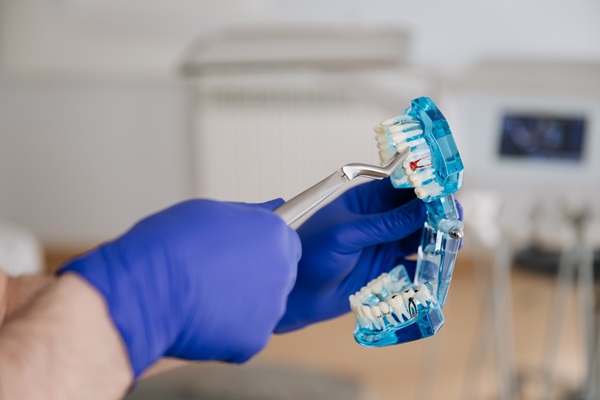Tooth Extraction for an Impacted Tooth
comes in different forms and for different reasons. This is not ordinarily the method that dentists prefer, but in some cases, removing a tooth is the right treatment. Often, a tooth is already in place when the dentist needs to remove it. However, a tooth can also be impacted and still require an extraction. The process is more extensive for an impacted tooth. If you are going to the dentist’s office for such a procedure, you should first learn about what to expect.
When tooth extraction is necessary
Dentists can often restore a tooth through various treatments. These include dental crowns, dental veneers, or fillings. Sometimes, however, it is impossible to save a tooth. In such cases, the dentist will have to remove it. After removing the tooth, the dentist may recommend replacing it, though this is not always the preferred method.
Extracting a tooth makes sense when there is extensive damage that restorative methods cannot treat. This could include a fracture or crack. Widespread decay can also be a reason to pull out a tooth. The decayed tooth can be painful and affect the pulp and roots. Also, if there is crowding in the mouth, removing a tooth or multiple teeth can create more space for the rest of the teeth.
Preparation
When the dentist decides that tooth extraction is the right course, there will be a consultation with the patient. Here, the dentist will explain the process and what the patient can expect before, during, and after the extraction. The patient can ask questions and express concerns at this time. This meeting is also a good occasion for the patient to inform the dentist of any medical conditions or recent surgeries they have had.
Removing the tooth
For the impacted tooth, the dentist will either use a local anesthetic to numb the area or use a general anesthetic. Many patients prefer the latter, as the extraction will be invasive. Once the patient is numb or asleep, the dentist will make an incision in the gums. The dentist will cut the tooth into a few pieces, helping with the removal process. It may also be necessary to cut away some of the bone surrounding the tooth.
After the procedure
The dentist will stitch the incision wound and control any bleeding. The use of gauze pads will help. After the patient wakes up (if the dentist used general anesthesia), the dentist will monitor the person to make sure there are no immediate side effects from the procedure. Another person should accompany the patient home.
Recovery
The dentist may write a prescription for a pain reliever for the patient to take. Otherwise, the patient can take an over-the-counter medication. The patient should rest for the next 24 hours or more. Using an ice pack on the mouth can control any swelling. The patient should contact the dentist if there is any bleeding after the first day.
Benefits of impacted tooth removal
Impacted wisdom teeth can put pressure on the neighboring tooth. It can loosen the neighboring tooth. This will make the adjacent tooth prone to infection and eventual bone loss. Impacted third molars are also difficult to clean. This increases its risk of developing decay. Removing impacted teeth can prevent root canal treatments.
The development of third molars can result in crowding. This can cause damage to the neighboring molars. Removing impacted wisdom teeth can free the rest of the molars to function well. It can prevent future lengthy orthodontic treatments.
Impacted tooth removal can also lower the risk of inflammation and oral disease. Gum inflammation can become persistent. This can then be challenging to treat. The infection can reach the nerves, gums, and even the bloodstream.
Impacted teeth can cause jaw damage and tumors. These growths can cause serious pain, especially in the jaw area. The patient does not need to endure the discomfort. Removing the impacted tooth can prevent these from happening.
Pain can be debilitating. When this occurs in the teeth and gums, the pain seems to spread throughout the body. It is difficult to concentrate on tasks if there is nagging pain. Impacted teeth place pressure on the jawbone, temporomandibular joint, and surrounding soft tissues. Removing the source of this pain can end the discomfort. It can even end chronic headaches.
Have a successful procedure for impacted tooth removal
Having a tooth extraction is nothing you need to be afraid of. This process is involved but is an effective way to remove an impacted tooth. If you have tooth pain or crowding in your mouth, help is available. Schedule an appointment with your dentist to begin the process.
Request an appointment here: https://www.riversdentistry.com or call Rivers Family Dentistry at (979) 710-2216 for an appointment in our Bryan office.
Check out what others are saying about our dental services on Yelp: .
Related Posts
Tooth extraction is typically used as a last resort when a tooth is too damaged to be repaired. Wisdom teeth are the exception to this practice because they are the only set of teeth that most people do not need. However, dentists often recommend extracting wisdom teeth even if they are healthy, and it is…
If you are considering a wisdom teeth removal in Bryan, call our office and schedule a consultation. Not everyone needs to have their wisdom teeth removed. If there is room in your mouth for this third set of molars and they grow in properly, you could continue to live with them without experiencing any irritation.…
Pain or discomfort in your mouth might call for an emergency dentist. Emergency dentists often treat cracked or broken teeth, knocked-out teeth, and severe mouth pain. Some swollen jaws are considered dental emergencies as well. Read on to learn what constitutes a swollen jaw emergency and how emergency dentists can help.If the swelling in your…
When dentures break, patients may have difficulty with daily activities, such as speaking and eating. Do not wait until your next regular dental appointment to address this issue. If you cannot be seen in a timely manner, an emergency dentist can help patients restore their dentures as quickly as possible.Dentures are usually durable but do…


